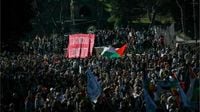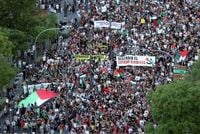Across Europe and beyond, a wave of pro-Palestinian demonstrations has swept major cities, as hundreds of thousands of people have taken to the streets to demand an immediate end to Israel’s two-year war on Gaza. The scale and intensity of the protests, which peaked over the weekend of October 4 and 5, 2025, reflect mounting outrage over the conflict’s devastating toll and growing impatience with Western governments’ responses.
In Amsterdam, an estimated 250,000 demonstrators filled Museum Square before marching through the city center. Draped in Palestinian flags and dressed in red, the crowd called on the Dutch government to adopt a tougher stance against Israel and halt arms exports. According to The Associated Press, protester Marieke van Zijl explained the motivation: “The bloodshed must stop – and that we unfortunately have to stand here because we have such an incredibly weak government that doesn’t dare to draw a red line. That’s why we are here, in the hope that it helps.”
The timing is significant: the protest comes less than a month before national elections, putting added pressure on Dutch leaders who have historically aligned with Israel. Responding to the public’s anger, Foreign Minister David van Weel said on October 3 that it was “unlikely” the government would approve the export of F-35 jet parts to Israel. Amnesty International, a key organizer, called on European governments to act decisively. “All economic and diplomatic means must be used to increase pressure on Israel,” spokesperson Marjon Rozema urged, as cited by Al Jazeera.
The Netherlands was not alone in seeing massive turnout. In Rome, police reported some 250,000 people demonstrating for the fourth consecutive day, following Israel’s interception of a 45-strong flotilla seeking to deliver humanitarian aid to Gaza. The flotilla, named Global Sumud, left Barcelona in early September and was stopped in international waters earlier in the week. Around 50 Spaniards on the flotilla were detained by Israel, Spanish Foreign Minister Jose Manuel Albares told public television.
Protesters in the Italian capital, including families with children, shouted, “We are all Palestinians,” “Free Palestine,” and “Stop the genocide,” with many carrying Palestinian flags and wearing keffiyehs. Some demonstrators defaced a statue of Pope John Paul II, an act condemned by Prime Minister Giorgia Meloni as “shameful.” Meloni’s hard-right government has faced criticism for its perceived inaction on the siege of Gaza, with many Italians demanding a stronger response.
Spain’s response has been notably forceful. On October 4, 2025, about 70,000 people marched in Barcelona and nearly 92,000 in Madrid. In September, Spain announced a ban on imports from Israeli settlements in the occupied West Bank, which UN rights chief Volker Turk has described as a war crime. Prime Minister Pedro Sanchez went further, suggesting Israel should be barred from international sport over the Gaza war, drawing a parallel with penalties imposed on Russia following its invasion of Ukraine. In a dramatic moment on September 14, about 100,000 pro-Palestinian demonstrators forced the suspension of the final stage of the Vuelta a España cycling race in Madrid, where an Israeli team was competing.
Elsewhere, thousands marched in Dublin, Ireland, marking what organizers described as “two years of genocide” in Gaza. Ireland, alongside Spain, has emerged as one of the fiercest European critics of Israel’s military offensive. Speakers in Dublin called for sanctions on Israel and an immediate end to the conflict, as well as Palestinian involvement in any ceasefire plan.
In Paris, about 10,000 people gathered in support of the Global Sumud flotilla and pledged to continue sending humanitarian convoys. Helene Coron, spokesperson for the French contingent of the flotilla, told the crowd: “We’ll never stop. This flotilla didn’t get to Gaza. But we’ll send another, then another until Palestine and Gaza are free.”
Across the continent, the protests have been marked by powerful symbolism and a sense of urgency. In Barcelona, demonstrators carried white bundles representing the bodies of Gaza’s children. In Sofia, Bulgaria, placards read “Gaza: Starvation is a Weapon of War” and “Gaza is the Biggest Graveyard of Children.” Protester Valya Chalamova told Anadolu Agency, “Our society – and the world – needs to hear that we stand with the Palestinian people.”
Support for the Palestinian cause is especially strong in Turkiye, where President Recep Tayyip Erdogan has emerged as one of Israel’s most vocal critics, repeatedly accusing it of war crimes in Gaza. On October 5, vast crowds marched through Istanbul from the Hagia Sophia mosque to the banks of the Golden Horn, where boats decorated with Turkish and Palestinian flags awaited. Demonstrators, many joining after midday prayers, called for Muslim unity in confronting Israel’s assault. In Ankara, protesters waved flags and held banners denouncing what they called ongoing genocide since 1948. Recep Karabal of the Palestine Support Platform declared, “This oppression, which began in 1948, has been continuing for two years, turning into genocide.”
The protests have not been without controversy. In London, police reported at least 442 arrests at a gathering supporting the banned Palestine Action group, following a deadly synagogue attack on October 2. Prime Minister Keir Starmer urged protesters to stay home, emphasizing public safety concerns. Still, the demonstrations proceeded, underlining the depth of feeling and determination among activists.
Amid the mass mobilizations, diplomatic efforts have continued. Negotiators were due in Cairo for talks on a Gaza ceasefire and the release of hostages around the same time as the protests. Hamas announced it had accepted parts of a ceasefire plan proposed by U.S. President Donald Trump, but much of Gaza remains in ruins and under siege. The humanitarian situation is dire: more than 67,000 Palestinians have been killed in the conflict, according to protest organizers and international agencies, and the enclave is teetering on the brink of famine.
Many protesters and organizations argue that Western governments, particularly in Europe, have not done enough to stop the violence or hold Israel accountable. Amnesty International’s call for “all economic and diplomatic means” to be used against Israel was echoed by demonstrators from Amsterdam to Rabat, where crowds burned an Israeli flag and called on Morocco’s government to reverse its 2020 decision to normalize ties with Israel. Protesters in Rabat also demanded the release of Moroccan human rights defender Aziz Ghali, detained by Israel after joining the flotilla.
As the war grinds on, the scale and passion of these demonstrations suggest that public opinion in Europe and beyond is shifting. Whether this will translate into concrete policy changes remains to be seen, but the message from the streets is clear: people are no longer willing to look away from the suffering in Gaza, and they are demanding action from their leaders.
With negotiations ongoing and the humanitarian crisis deepening, the world’s attention remains fixed on Gaza—and on the growing chorus of voices calling for peace, justice, and accountability.


